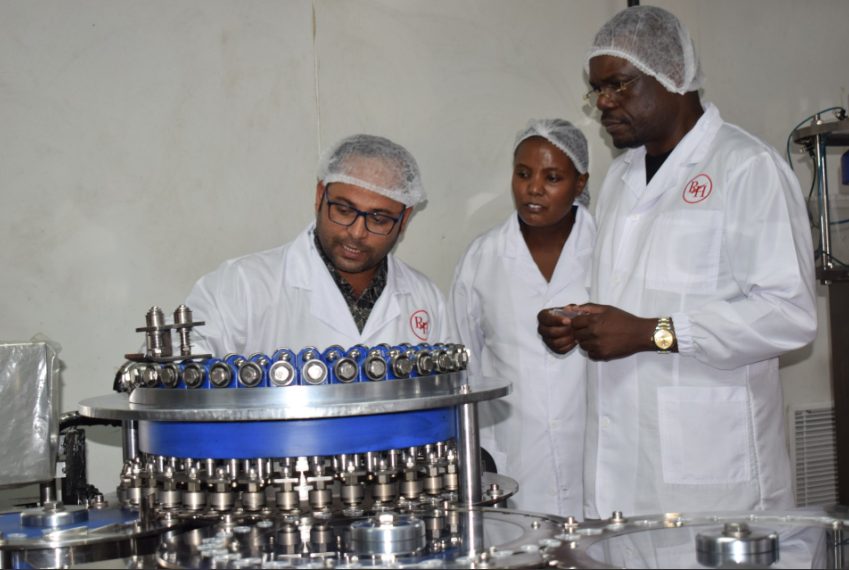A Landmark Agreement to Strengthen Africa’s Regulatory Systems and Foster Local Medical Production


By Baboloki Semele: In a significant move towards transforming Africa’s healthcare landscape, earlier this month, (February 2025), the African Union Development Agency – New Partnership for Africa’s Development (AUDA-NEPAD) and the Africa Centres for Disease Control and Prevention (Africa CDC) have announced a groundbreaking agreement aimed at boosting collaboration and enhancing regulatory processes across the continent. The signing of a Memorandum of Understanding (MoU) between Africa’s leading National Regulatory Authorities (NRAs), all of which have achieved WHO Maturity Level 3 (ML3) status, marks a major milestone in the quest to create a more efficient, responsive, and self-sufficient medical regulatory environment in Africa.
The MoU, signed by the Food and Drugs Authority (FDA) of Ghana, Nigeria’s National Agency for Food and Drug Administration and Control (NAFDAC), Rwanda FDA, Senegal’s Pharmaceutical Regulatory Agency (ARP), South Africa’s Health Products Regulatory Authority (SAHPRA), Tanzania’s Medicines & Medical Devices Authority (TMDA), and Zimbabwe’s Medicines Control Authority (MCAZ), will fundamentally transform the way medical products are regulated on the continent. This collaboration will streamline approval processes for medicines, vaccines, and medical devices, expediting the path from production to delivery across African countries.
The partnership comes at a time when Africa is increasingly turning to its own resources to meet its healthcare needs, making regulatory harmonization and efficiency crucial in ensuring timely access to safe and effective medical products. This initiative is designed not only to improve the speed of regulatory approvals but also to foster a favorable environment for the local production of vaccines, medicines, and diagnostics.
The media release from African Union Development Agency and African Centre for Disease Control says the MoU has the potential to revolutionize Africa’s medical regulatory systems by allowing NRAs to share assessment reports, quality control laboratory results, and inspection findings. This shared information will reduce duplication of effort, save costs, and significantly accelerate the approval of vital medical products. By relying on the expertise of leading regulatory authorities, less resourced countries will benefit from enhanced regulatory capacity while ensuring products meet both regional and international standards.
“The aim is clear: to streamline the submission and evaluation processes, reduce delays, and ultimately increase the availability of life-saving medicines,” The release qoutes H.E. Nardos Bekele-Thomas, CEO of AUDA-NEPAD. “For Africa to be able to manufacture and distribute medical products at scale, we must foster trust in each other’s regulatory decisions. This MoU takes us a giant step closer to a harmonized regulatory system that will make medicines and vaccines more accessible across the continent.”
The release says in addition to improving regulatory processes, this MoU also strengthens Africa’s ability to respond quickly to health crises. By enabling regulatory authorities to collaborate more closely, the agreement enhances the continent’s ability to manage public health emergencies, ensuring faster regulatory approval for vaccines and medical supplies in the event of outbreaks. The Africa CDC sees this as an important step toward increasing the continent’s preparedness for future health crises, enabling quicker responses to outbreaks like the recent Ebola and COVID-19 pandemics.
H.E. Dr. Jean Kaseya, Director General of Africa CDC, emphasized that the MoU aligns with the Africa CDC’s goal of increasing local manufacturing of medical products. “This agreement empowers African countries to meet the urgent need for medical supplies within their borders,” said Dr. Kaseya. “By streamlining regulatory approvals, we are not only preparing for the next public health emergency but also building a stronger, more resilient healthcare system.”
A key element of the MoU is its potential to stimulate local manufacturing of vaccines, medicines, and medical devices. Africa has long been dependent on external suppliers for its medical products, which has proven unsustainable, especially in the face of global health crises. This agreement supports Africa’s transition towards self-sufficiency by ensuring that local manufacturers have a clear path for regulatory approval and a better understanding of the requirements needed to meet international standards.
Through the Africa Medicines Regulatory Harmonization (AMRH) initiative, which is backed by AUDA-NEPAD and the upcoming operationalization of the African Medicines Agency (AMA), this MoU further strengthens the continent’s regulatory systems and provides a foundation for expanding Africa’s pharmaceutical production capabilities.
A Step Toward Continental Health Integration
The MoU not only benefits the signatory countries but also has broader implications for the entire continent. It serves as a precedent for future collaborations, promoting cross-border regulatory cooperation and fostering regional integration. As African countries work together to strengthen their healthcare systems, this agreement represents a shared commitment to improving health outcomes and ensuring access to the essential medical products that are critical to saving lives.
The Road Ahead: Scaling the MoU’s Impact
While this MoU represents a monumental achievement in Africa’s regulatory landscape, its true impact will depend on its ability to scale. As the agreement moves forward, the focus will shift toward ensuring effective implementation, expanding partnerships with other African countries, and leveraging new technologies to enhance regulatory processes. Additionally, there will be ongoing efforts to enhance the capacity of smaller, less-resourced regulatory authorities, allowing them to benefit from the expertise and infrastructure of their more established counterparts.
As AUDA-NEPAD’s AMRH initiative and Africa CDC’s mission continue to evolve, the signing of this MoU stands as a testament to the continent’s commitment to strengthening its health systems and ensuring that safe and effective medical products are accessible to all Africans, faster and more efficiently.
This collaboration marks not only a significant milestone in regulatory governance but also a major leap toward the continent’s long-term healthcare security and self-reliance. The future of African health is being shaped today, with this agreement as a pivotal step in the journey toward stronger, more integrated, and self-sufficient health systems across the continent.
About the Africa Centres for Disease Control and Prevention (Africa CDC)
The Africa CDC is the public health agency of the African Union, working to support member states in strengthening health systems, improving disease surveillance, and responding to public health emergencies. Learn more at: www.africacdc.org.
About African Medicines Regulatory Harmonization (AMRH)
The AMRH initiative began in 2009 with the goal of addressing challenges in Africa’s medicine regulatory systems. This includes improving efficiency, reducing delays in medicine approvals, and ultimately ensuring better access to affordable medicines for all Africans.





